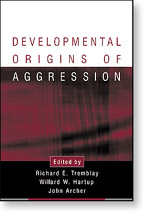 by Edited by Richard E. Tremblay, Willard W. Hartup, and John Archer
by Edited by Richard E. Tremblay, Willard W. Hartup, and John Archer
Findings from major longitudinal research programs are used to illuminate the processes by which most children learn alternatives to physical aggression as they grow older, while a minority become increasingly violent.
Full Description:
While aggression is often conceived as a learned behavior that peaks during adolescence, this important volume shows that aggressive behaviors have their origins in early childhood and even infancy. Findings from major longitudinal research programs are used to illuminate the processes by which most children learn alternatives to physical aggression as they grow older, while a minority become increasingly violent. The developmental trajectories of proactive, reactive, and indirect aggression are reviewed, as are lessons learned from animal studies. Bringing together the best of current knowledge, the volume sheds new light on the interplay of biological factors, social and environmental influences, and sex differences in both adaptive and maladaptive aggression. "In addition to being a rich source of material to those keeping abreast of aggression research, Developmental Origins of Aggression could be used as a graduate text. The book would nicely serve as a discussion piece for a developmental psychology course or a seminar on aggression in peer relations....The book is informative for those conducting aggression research but also offers theoretical viewpoints that may benefit other scientific ares and would be a useful teaching resource."
-APA PsycCRITIQUES Benjamin K. Barton, February 2, 2006) "Our understanding of aggression has gone through a virtual revolution during the past few decades. This splendid book admirably indicates what is new about the ideas and findings, why they are important, and how they should influence policy and practice. The approach taken is critical but constructive, and readers will gain an appreciation of the excitement of the field, the puzzles that remain, and the challenges ahead. Altogether, this is a remarkable book that researchers and practitioners alike will want to turn to for years to come. It provides answers where they are available and provokes questioning thought when that is what is needed."
-Michael Rutter, MD, Institute of Psychiatry, King's College, London, UK "With impeccable scholarship and compelling writing, this book convinced me that aggression is a natural feature of human and animal development. Each chapter speaks with authority, and together the chapters record everything known about the origins of aggression. An essential reference for anyone striving to understand where antisocial behavior comes from."
-Terrie E. Moffitt, PhD, Institute of Psychiatry, London, UK, and University of Wisconsin, Madison "This is a superb, cutting-edge volume that advances our understanding of why some youth and adults are aggressive and commit acts of violence against others. Developmental Origins of Aggression should be required reading for students from a wide variety of fields--including psychology, medicine, social work, criminology, and sociology--who are interested in human behavior."
-Frederick P. Rivara, MD, MPH, Department of Pediatrics, University of Washington School of Medicine
480 Pages
ISBN:
I. Introduction
1. The Development of Aggression: Where Do We Stand?, Willard W. Hartup
II. The Development of Aggression in Animals and Humans
2. Subtypes of Aggression in Humans and Animals, Paul L. Gendreau and John Archer
3. Play Fighting: Aggression, Affiliation, and the Development of Nuanced Social Skills, Sergio M. Pellis, Vivien C. Pellis, and Afra Foroud
4. Genetic and Environmental Factors Influencing the Expression of Impulsive Aggression and Serotonergic Functioning in Rhesus Monkeys, Stephen J. Suomi
5. The Developmental Origins of Physical Aggression in Humans, Richard E. Tremblay and Daniel S. Nagin
6. The Beginnings of Aggression in Infancy, Dale F. Hay
7. Play and the Regulation of Aggression, Jordan B. Peterson and Joseph L. Flanders
8. Indirect Aggression among Humans: Social Construct or Evolutionary Adaptation?, Tracy Vaillancourt
9. Proactive and Reactive Aggression: A Developmental Perspective, Frank Vitaro and Mara Brendgen
10. Homicide, Violence, and Developmental Trajectories, Rolf Loeber, Eric Lacourse, and D. Lynn Homish
III. Determinants of Aggression
11. Genetics and the Development of Aggression, Daniel P russe and Paul L. Gendreau
12. Mapping Brain Development and Aggression, Tom š Paus
13. Neuromodulators in the Development and Expression of Inhibition and Aggression, Robert O. Pihl and Chawki Benkelfat
14. Hormones and the Developmental Origins of Aggression, Stephanie H. M. Van Goozen
15. Executive Function in Early Physical Aggression, Jean Richard S guin and Philip David Zelazo
16. Language Development and Aggressive Behavior, Ginette Dionne
17. The Intergenerational Transmission of Aggression and Antisocial Behavior, Mark Zoccolillo, Elisa Romano, David Joubert, Tania Mazzarello, Sylvana C t , Michel Boivin, Daniel P russe, and Richard E. Tremblay
18. Peer Relationships and the Development of Aggressive Behavior in Early Childhood, Michel Boivin, Frank Vitaro, and Fran ois Poulin
19. Social Capital and Physical Violence, Uberto Gatti and Richard E. Tremblay
20. Sex Differences in Aggressive Behavior: A Developmental and Evolutionary Perspective, John Archer and Sylvana C t
IV. Challenges for the Future
21. The Developmental Origins of Aggression: Where Are We Going?, Richard E. Tremblay and Sylvana C t
|